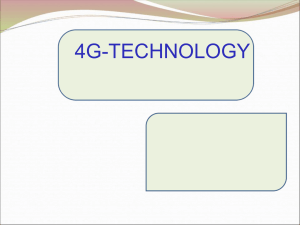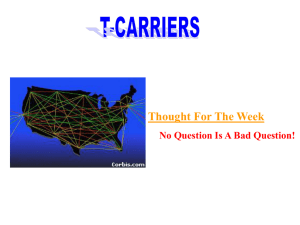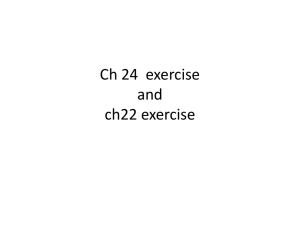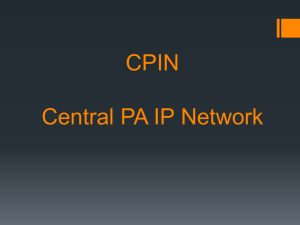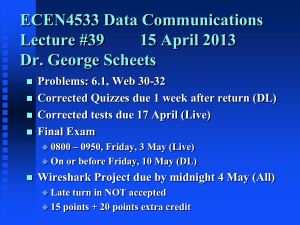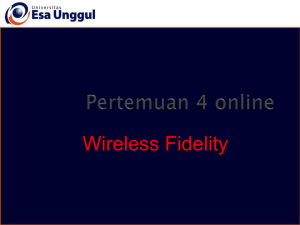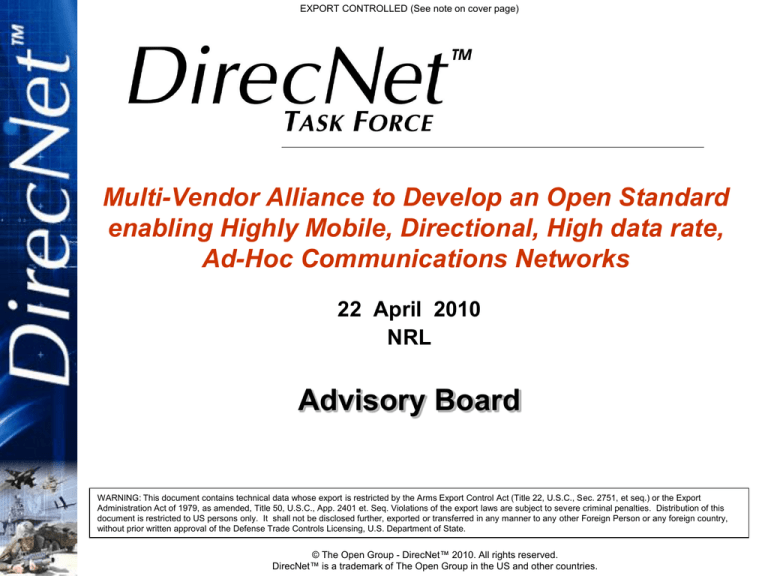
EXPORT CONTROLLED (See note on cover page)
Multi-Vendor Alliance to Develop an Open Standard
enabling Highly Mobile, Directional, High data rate,
Ad-Hoc Communications Networks
22 April 2010
NRL
Advisory Board
WARNING: This document contains technical data whose export is restricted by the Arms Export Control Act (Title 22, U.S.C., Sec. 2751, et seq.) or the Export
Administration Act of 1979, as amended, Title 50, U.S.C., App. 2401 et. Seq. Violations of the export laws are subject to severe criminal penalties. Distribution of this
document is restricted to US persons only. It shall not be disclosed further, exported or transferred in any manner to any other Foreign Person or any foreign country,
without prior written approval of the Defense Trade Controls Licensing, U.S. Department of State.
© The Open Group - DirecNet™ 2010. All rights reserved.
DirecNet™ is a trademark of The Open Group in the US and other countries.
EXPORT CONTROLLED (See note on cover page)
Why the Formation of the
DirecNet Advisory Board
The Advisory Board has been established to facilitate the goal of
the National Technology Transfer Act and OMB Circular A-119
that “…encourages the participation of Federal government
representatives in a voluntary consensus standards body
thus increasing the likelihood that standards under
development will meet both public and private sector
needs.” *
* CIRCULAR NO. A-119 February 10, 1998
© The Open Group - DirecNet™ 2010. All rights reserved.
DirecNet™ is a trademark of The Open Group in the US and other countries.
2
EXPORT CONTROLLED (See note on cover page)
Non Attribution
What happens in the advisory board, stays
at the advisory board.
Guidance is from the Advisory Board – not
from a named person.
© The Open Group - DirecNet™ 2010. All rights reserved.
DirecNet™ is a trademark of The Open Group in the US and other countries.
3
EXPORT CONTROLLED (See note on cover page)
Advisory Board
Intro
Ray Cole
DirecNet TF Agenda, Overview
Dave Bryant
SDWG Status
Keith Olds
BWG Summary
Andy Hunton
Discussions
Ray Cole - All
© The Open Group - DirecNet™ 2010. All rights reserved.
DirecNet™ is a trademark of The Open Group in the US and other countries.
4
EXPORT CONTROLLED (See note on cover page)
DirecNetTM
• Vision
– The DirecNet™ Task Force will standardize directional,
IP-enabled, highly-mobile, ad hoc mesh networks
through a validated open specification.
• Mission
– The DirecNet™ Task Force will develop, validate and
publish a non-proprietary DirecNet™ open standard.
• Composition
– The DirecNet™ Task Force was formed under the legal
umbrella of The Open Group
– Membership consists of industry representatives and
elected advisors
© The Open Group - DirecNet™ 2010. All rights reserved.
DirecNet™ is a trademark of The Open Group in the US and other countries
5
EXPORT CONTROLLED (See note on cover page)
DirecNetTM Formation
• DirecNetTM multi-vendor alliance formed in July 2006
• Open, nonproprietary standard under development by recognized leaders in the
development of military communications systems
• Members:
– BBN (Associate)
– BAE Systems
– The Boeing Company
– Cubic Defense Applications
– General Dynamics (Associate)
– Harris
– ITT Industries
– Elbit America
– L-3 Communications
– Northrop Grumman
– Raytheon
– Rockwell Collins
– Viasat (Associate)
• Open specification hosted by The Open Group
© The Open Group - DirecNet™ 2010. All rights reserved.
DirecNet™ is a trademark of The Open Group in the US and other countries
66
EXPORT CONTROLLED (See note on cover page)
DirecNet™ Task Force Organization
John (Jay) Spaulding, Director (OpenGroup)
Dave Bryant (Boeing)
Dave Laney (Cubic)
Ray Cole (NRL)
Keith Olds (Harris) Andy Hunton (BAE)
Rachel Rivera (RC) Howard Elowitz (Raytheon)
© The Open Group - DirecNet™ 2010. All rights reserved.
DirecNet™ is a trademark of The Open Group in the US and other countries
7
EXPORT CONTROLLED (See note on cover page)
DirecNetTM
• DirecNetTM enables linking of fixed and mobile platforms
via self-organizing networks sharing near real time
information throughout the BattleSpace
March 22, 2007
© The Open Group - DirecNet™ 2010. All rights reserved.
DirecNet™ is a trademark of The Open Group in the US and other countries
88
Civilian Fixed Infrastructure
EXPORT CONTROLLED (See note on cover page)
Where DirecNet Fits in the Big Picture
Internet
Wireless Cluster
(Hub & Spoke)
High Speed
IP Packet
Routers
Radio Link
Trunk Lines
Military Mobile Infrastructure
Fiber Optic
Trunk Lines
Wireless Cluster
(Hub & Spoke)
DirecNet
Ground Entry Point
To GIG
JTRS or Other
Cluster
Link-16 or
other Network
Intra-TF
Networks
DirecNet Goal: Emulate Fixed Internet Trunk Lines & Routing Infrastructure
EXPORT CONTROLLED (See note on cover page)
DirecNetTM Goals
•
•
•
•
•
•
•
•
•
•
Assured Multi-Vendor Interoperability
Increased User Data throughput (Gbps)
Long range connectivity
Enhanced Spectrum Efficiency – Increased Node
Density
Ad-Hoc Networking
IP Enabled
Beyond Line-of-Sight operation, Relay functions
Enable new operational capabilities
Open industry standard encouraging competition,
ensuring affordability
Provide secure, timely access to pertinent data
© The Open Group - DirecNet™ 2010. All rights reserved.
DirecNet™ is a trademark of The Open Group in the US and other countries
10
EXPORT CONTROLLED (See note on cover page)
Operational Concept
GIG
Tier 1
FAB-T,
SATCOM
CONUS
Tier 2
Sensor
data
DirecNet
DirecNet
DirecNet
GEP to GIG
Weapon
Tier 3
Ground troops
HMMV
Local Area Networks
March 22, 2007
Design Objectives:
• Maximize spectrum reuse
• No fixed infrastructure
• Network capacity scales with
users
• Automated in-band and out-ofband neighbor discovery
•Cannot compromise
probability of detection in the
neighbor discovery process
• Decentralized rule-based ad hoc
topology management
•Dynamic bandwidth allocation
• Supports multiple data rates
• Every node an IP router
• Commercial practice layer 3
networking
• No single point of failure
© The Open Group - DirecNet™ 2010. All rights reserved.
DirecNet™ is a trademark of The Open Group in the US and other countries.
11
11
EXPORT CONTROLLED (See note on cover page)
Specification Development
Working Group
Advisory Board Report
April 22, 2010
EXPORT CONTROLLED (See note on cover page)
Agenda
• Review PHY Document Comment Status
• Data Link Layer Document Status
EXPORT CONTROLLED (See note on cover page)
Certification
Documents
Product 1
Mobile Ad Hoc Networking
Product 2
MAC Logical Link Control
Data MAC
BE TRANSEC…
MAC …
ND …
PHYs
Submitted for
Member
Review
Product 3
…
Data Structures
Waveform Management
Functional Description
System Requirements
Current
SDWG
Focus Product
Interoperability Requirements Documents
Security Management
Reference
Documents
Overview and Architecture Document
Standards Documents
Product N
EXPORT CONTROLLED (See note on cover page)
DirecNet Standard
TM
Reference System Diagram
DirecNet
Reference Architecture
Rev 8
1
2
3
4
5
6
7
8
MANET
9
10
11
14
SECURITY
MANAGEMENT
WAVEFORM
MANAGEMENT
12
15
LOGICAL
LINK
13
17
16
18
MEDIA
ACCESS
The DirecNetTM Reference
Architecture Maps 213
requirements from the
Functional Description
Document to process blocks
and interfaces which are
defined in the Interoperability
Standard Documents
19
20
Overview and Architecture
Document
21
PHYSICAL
22
23
24
25
Interface Legend
Intra-Node Internal Interface
External Interface
Inter-Node Internal Interface
From External Interface Only
• Defines the Reference
Architecture
• Interfaces
• Functions
• Provides a “Roadmap” through
the standards documents
EXPORT CONTROLLED (See note on cover page)
Physical Layer Document Status
EXPORT CONTROLLED (See note on cover page)
PHY Review Comments
SDWG Response
• 32 comments were received from the
member companies
• 26 have been dispositioned by the SDWG
– 14 resulted in document changes
– 13 did not require a document change
• 6 required additional effort
– 1 returned for clarification
– 5 have require additional technical study to
complete the SDWH response
EXPORT CONTROLLED (See note on cover page)
Study Areas Raised by the Comments
• PHY Layer Overhead Discussions
– Overhead for linearization and transmitter
settling
– Overhead for equalizer training
– Overhead for Doppler compensation and
frequency estimation
– Support for real-time and post-processing
modems
• Power efficiency of pulse shaped OQPSK
vs. QPSK
– Reconciliation of contradictory study results
EXPORT CONTROLLED (See note on cover page)
PHY Overview
EXPORT CONTROLLED (See note on cover page)
Modulation Trade Space
Multiple Carrier (OFDM)
Single Carrier
Contiguous
Channel BW
Spread Spectrum
Minimum BW
Modulation
Formats
Constant Envelope
(Max Pwr Eff)
BPSK
QPSK
8PSK
GMSK
Other
Modulation
Formats
BPSK
QPSK
16 QAM
64 QAM
Other
Spread Spectrum
Modulation
Formats
BPSK
Minimum BW
Modulation
Formats
Non-Contiguous
Channel BW
BPSK
QPSK
16 QAM
64 QAM
Other
Trade results depend on channel conditions
Minimum BW
Spread Spectrum
Modulation
Formats
BPSK
Modulation
Formats
BPSK
QPSK
16 QAM
64 QAM
Other
EXPORT CONTROLLED (See note on cover page)
PHY Definition
EXPORT CONTROLLED (See note on cover page)
Data Rate Table
Modulation
BPSK
BPSK
QPSK
QPSK
16 QAM (APSK)
16 QAM
64 QAM
64 QAM
256 QAM
256 QAM
Code Rate
0.667
0.750
0.667
0.842
0.667
0.842
0.667
0.842
0.667
0.842
0.96 Msps
2.5 Msps
1.200 MHz
3.125 MHz
0.6 Mbps
0.7 Mbps
1.3 Mbps
1.6 Mbps
2.6 Mbps
3.2 Mbps
3.8 Mbps
4.9 Mbps
5.1 Mbps
6.5 Mbps
1.7 Mbps
1.9 Mbps
3.3 Mbps
4.2 Mbps
6.7 Mbps
8.4 Mbps
10.0 Mbps
12.6 Mbps
13.3 Mbps
16.8 Mbps
5.0 Msps
7.2 Msps
6.25 MHz
3.3 Mbps
3.8 Mbps
6.7 Mbps
8.4 Mbps
13.3 Mbps
16.8 Mbps
20.0 Mbps
25.3 Mbps
26.7 Mbps
33.7 Mbps
10.0 Msps
9.00 MHz
4.8 Mbps
5.4 Mbps
9.6 Mbps
12.1 Mbps
19.2 Mbps
24.3 Mbps
28.8 Mbps
36.4 Mbps
38.4 Mbps
48.5 Mbps
12.5 MHz
6.7 Mbps
7.5 Mbps
13.3 Mbps
16.8 Mbps
26.7 Mbps
33.7 Mbps
40.0 Mbps
50.5 Mbps
53.3 Mbps
67.4 Mbps
BR-2
•
Symbol Rate
20.0 Msps
40.0 Msps
Channel Bandwidth
25.0 MHz
50.0 MHz
Burst Data Rate
13.3 Mbps
26.7 Mbps
15.0 Mbps
30.0 Mbps
26.7 Mbps
53.3 Mbps
33.7 Mbps
67.4 Mbps
53.3 Mbps
106.7 Mbps
67.4 Mbps
134.7 Mbps
80.0 Mbps
160.0 Mbps
101.1 Mbps
202.1 Mbps
106.7 Mbps
213.3 Mbps
134.7 Mbps
269.5 Mbps
CDL Basic Rates
BR-10.71
BR-21.42
Mandatory Channels for Interoperability
– UHF, L-Band and S-Band
• 1.2 MHz
– C-Band and X-Band
• 6.26 MHz
– Ku-Band and Above
• 25 MHz
72.0 Msps
120.0 Msps
240.0 Msps
320.0 Msps
90.0 MHz
150.0 MHz
300.0 MHz
400.0 MHz
48.0 Mbps
54.0 Mbps
96.0 Mbps
121.3 Mbps
192.0 Mbps
242.5 Mbps
288.0 Mbps
363.8 Mbps
384.0 Mbps
485.1 Mbps
80.0 Mbps
90.0 Mbps
160.0 Mbps
202.1 Mbps
320.0 Mbps
404.2 Mbps
480.0 Mbps
606.3 Mbps
640.0 Mbps
808.4 Mbps
160.0 Mbps
180.0 Mbps
320.0 Mbps
404.2 Mbps
640.0 Mbps
808.4 Mbps
960.0 Mbps
1212.6 Mbps
1280.0 Mbps
1616.8 Mbps
213.3 Mbps
240.0 Mbps
426.7 Mbps
538.9 Mbps
853.3 Mbps
1077.9 Mbps
1280.0 Mbps
1616.8 Mbps
1706.7 Mbps
2155.8 Mbps
BR-44.73
BR-137
BR-274
EXPORT CONTROLLED (See note on cover page)
Data Link Layer Document Status
EXPORT CONTROLLED (See note on cover page)
Data Link Layer Document
Status
1
INTRODUCTION
3
2
TABLE OF CONTENTS
9
3
LIST OF FIGURES
11
4
LIST OF TABLES
11
5
SCOPE 12
6
PURPOSE
13
7
OVERVIEW
14
8
REFERENCES
15
9
GLOSSARY
16
9.1
Definitions
16
9.2
Abbreviations and acronyms
9.3
Conventions
10
DIRECNET CONTEXT
21
11
LINK LAYER CONTEXT
23
19
18
EXPORT CONTROLLED (See note on cover page)
Data Link Layer Document
Status
12
LOGICAL LINK CONTROL SUBLAYER FUNCTIONS
12.1
LOGICAL LINK CONTROL OVERVIEW
12.1.1
Node State
12.1.2
Neighborhood Management
24
24
24
12.1.2.1 Neighborhood Member State Machine
24
12.1.3
In-band Control 28
12.2
NEIGHBOR DISCOVERY 28
12.2.1
Tightly Coupled In-band Neighbor Discovery
12.2.2
Tightly Coupled Out-of-band Neighbor Discovery
12.2.3
Loosely Coupled Neighbor Discovery
12.3
NEIGHBORHOOD CONNECTIVITY MANAGEMENT 29
24
EXPORT CONTROLLED (See note on cover page)
Data Link Layer Document
12.4
Link Establishment
29
Status
12.4.1
Message Types 29
12.4.2
State Machine
12.4.3
Nominal Link Establishment Vignettes
12.5
Link Maintenance
12.5.1
Power Control and Rate Adaptation
35
12.5.2
Outage Management/Link Recovery
37
12.7.1
Link Loss Detection
12.7.2
Link Recovery
12.5.3
Position Tracking
12.5.4
Demand Assessment – Throughput
12.6.1
Link Tear Down 38
12.6.2
Reuse Maintenance
38
12.6.3
Interference Detection
38
30
31
35
37
37
EXPORT CONTROLLED (See note on cover page)
Data Link Layer Document
Status
13
13.1
13.1.1
13.1.2
13.1.2.1
13.1.2.2
13.1.2.3
13.1.2.4
13.1.3
13.1.4
13.1.5
13.1.5.1
13.1.5.2
13.1.5.3
13.1.5.4
13.1.5.5
MEDIUM ACCESS CONTROL FOR THE BE-DN PHY
39
MAC Control Plane
39
TDD Operation 39
TDMA Framing Definition39
Link Layer Timing
39
Time Slot Control
39
Transmit Slot Timing
39
Receive Window Timing 39
Multiple Access 39
Demand Assignment
39
Radio Resource Scheduling
39
Time/Beam Scheduling 39
Frequency Scheduling 39
Modulation Scheduling 39
Power Scheduling
39
Multi-Carrier Tx/Rx Schedule Coordination
39
EXPORT CONTROLLED (See note on cover page)
Data Link Layer Document
13.2
MAC Data Plane Functions
for The BE-DN PHY
39
Status
13.2.1 Data Encapsulation
39
13.2.1.1 TDU Encapsulation
39
13.2.1.2 TDU Header
39
13.2.1.3 Packet Segmentation and Reassembly
39
13.2.2 Distribute Packet Segments
40
13.2.3 Link Layer Control Message Multiplexing 40
13.2.4 Time Slot Packing
40
13.2.5 TRANSEC Cover40
13.2.6 TRANSEC Encryption
40
13.2.7 TRANSEC Key Management
40
13.2.8 Link Layer QOS 40
13.2.8.1 Service Aware ARQ
40
13.2.8.2 Transmit Prioritization 40
14
PLATFORM DYNAMICS AND ON-THE-MOVE (OTM)
OPERATION
41
14.1
Maximum Aircraft Velocity
41
14.2
Maximum Relative Aircraft Velocity
41
14.3
Maximum Aircraft Altitude
41
14.4
Minimum Air-to-Air Range
41
14.5
Maximum Ground Vehicle Velocity
41
EXPORT CONTROLLED (See note on cover page)
Logical Link Control
EXPORT CONTROLLED (See note on cover page)
DirecNet Node Network States
Tx Permission
Net Acq. Failure
Network Entry
NET
Completed
Rendezvous ACQUISITION
(link formed)
Receipt
Loss
of NW
Hail
Receipt
Waveform
Start
ORPHAN
Hail Receipt
w/ code
Exit Silent
Watch
Go Silent
Command
Go Silent
Command
SILENT
WATCH
NET
MEMBER
Last Link Lost
Tx Permission
Go Silent
Command
The DirecNet Link Layer Operation and Behavior is Organized Around a
Node’s Role in the Network
EXPORT CONTROLLED (See note on cover page)
Neighborhood Management
EXPORT CONTROLLED (See note on cover page)
Neighborhood Member Relationships
• Each DirecNet “Local” Node
defines a unique “Neighborhood”
• The Neighborhood consists of all
nodes than may influence the Link
Layer operation of the local node
• Connection possibilities
Discovered &
added to the
Neighborhood
Tracking
Connection
Decision or
INVITE rcvd
• Interference potential
Link Establishment
• The Local Node maintains state on
all of its neighborhood’s members
• Neighborhood member state
defines the protocols and
operations conducted between the
local node and the Neighborhood
Member Node
Terminate
link
Link Established
Link Maintenance
EXPORT CONTROLLED (See note on cover page)
Neighborhood Member State
Machine
Identified
Blocked
Inviting
Invited
Countered
Poor
Neighbor
Good
Neighbor
EXPORT CONTROLLED (See note on cover page)
Link Layer Protocol Definition
EXPORT CONTROLLED (See note on cover page)
Link Establishment Protocol
IDENTIFIED
Good
INVIT
Rejected INVITE E
Bad INVITE
BLOCKED
INVITE_REJECT or
INVITE_TERMINATE
or bad
COUNTER_INVITE
Bad INVITE
Bad INVITE
COUNTERED
COUNTERED_1
Bad INVITE or
Timeout
Good
INVIT
E
Good
INVIT
E
INVITING
INVITING_1
Good COUNTER_INVITE
or Good INVITE
INVITING_2
INVITED
COUNTERED_2
INVITED_1
Timeout
INVITED_2
Neighbor feedback
INVITE_REPLY
INVITE_REPLY
POOR
EXPORT CONTROLLED (See note on cover page)
Invitation over MANET is preferred
Invite Channel Decision Flowchart
Connection Manager
decides to make a new
connection.
Start
Is Pending Neighbor
Routable?
In “Acquiring Network” or
“Net Member” state
No
Use scheduled
rendezvous time
Yes
Route Invite through
MANET layer
END
EXPORT CONTROLLED (See note on cover page)
DirecNet Schedule
2009
Q3
Q4
1.1 SDWG P&P
1.2 Reqts Defn
Doc Struct
1.3
IMP/IMS
1.4
1.5 Implement Plan
Q1
2010
Q2
Q3
Q4
Q1
2011
Q2 Q3
Q4
Q1
2013
2012
Q2 Q3 Q4 Q1 Q2 Q3 Q4
First draft
SC Doc Approval
Completed
1.6 Val/Cert Plan
1.7 Change Plan
1.8 FDD
DNStd 1: Overview/Arch
2.1
2.2 DNStd 10: PHY layer
2.3 DNStd 11: Data Link
2.4 DNStd 20: Manet
2.5 DNStd 101: Management
2.6 DNStd 102 Security
:
IMPLEMENTATION
VALIDATION/CERTIFICATION
CHANGES
TR
Demos
EXPORT CONTROLLED (See note on cover page)
Business Working Group
Advisory Board Meeting
Washington DC
NRL
22 April 2010
EXPORT CONTROLLED (See note on cover page)
BWG Agenda
•
Old/Current Business
–
–
–
–
•
MILCOM
JTEN / NATS Meetings
CDL RFI / Industry Days
BAA Status
New Business / Recommendations
– Voice-of-the-Customer (VOC) Plan [AI 159]
•
DirecNet Marketing Plan
39
EXPORT CONTROLLED (See note on cover page)
Old / Current
Business
EXPORT CONTROLLED (See note on cover page)
MILCOM DirecNet
Panel
EXPORT CONTROLLED (See note on cover page)
MILCOM DirecNet Panel
• Goal Expose the DoD community to the approach of the consortium
• Status Panel abstract submitted; awaiting acceptance from MILCOM UNCLASS
panel committee
• Panel Abstract
– There is an ever increasing need for a more robust, higher capacity and interoperable
communications infrastructure to support evolving DoD operational requirements.
David Narkevicius of OSD NII states: “DoD is working to achieve communications
interoperability, affordability, and incorporation of evolving technologies. The
Department depends on reliable and flexible communications to support warfighter
missions. In partnership with Industry, the Department is working to help develop future
communications capabilities. Efforts like the DirecNetTM consortium teaming across
industry are working to provide new communications capabilities offering interoperable,
flexible, high bandwidth communications with a structure to optimize competition for
cost savings to the Department.” This panel will discuss the DirecNetTM vision,
waveform requirements drivers and development status. The focus is on a certifiable,
non-proprietary, high capacity, directional mesh network RF-based waveform standard
providing vendor-to-vendor and joint forces interoperability, while reducing overall life
cycle cost.
• MILCOM 2010
– San Jose Convention Center, CA
– 31 Oct to 3 Nov 2010
42
EXPORT CONTROLLED (See note on cover page)
MILCOM DirecNet Panel
• Panel agenda
–
–
–
–
Introduction (Dave Narkevicius) – 10 min
DirecNet Overview (Dave Bryant) – 10 min
Company 10 minute Overviews – 10 min x4
Q&A ~ 30 min
• Panel members (draft)
–
–
–
–
–
–
Moderator: Dave Narkevicius (OSD NII/DoD-CIO)
Dave Bryant (Boeing)
Tim Hughes (Raytheon)
Andrew Hunton (BAE Systems)
David Laney (Cubic)
Alan Brown (President, Open Group)
Hopefully Two Of The Panel Members Will Be From DoD
43
EXPORT CONTROLLED (See note on cover page)
JTEN / NATS Meetings
April 6 & 8, 2010
EXPORT CONTROLLED (See note on cover page)
JTEN Meeting - DirecNet Objectives
Date: April 6
Location: Naval Research Labs; Wash DC
1. Familiarize JTEN with the Task Force's technical objectives
and multiple company organization.
2. Provide overview of DirecNet waveform to initiate
assessment as a candidate solution for JALN high capacity
backbone and transition capability.
3. Discuss potential DirecNet and industry participation in
JTEN evaluation of future tactical networks.
4. Discuss JTEN representation on the DirecNet Government
Advisory Board.
5. Generate an approach, in coordination with JTEN, for
generating requirements for future tactical networks
– e.g.: “Voice of the Customer" process to be conducted by DirecNet
Participating In The JTEN Meeting Was A Great Success
–
–
Completed
Open
45 45
EXPORT CONTROLLED (See note on cover page)
NATS Meeting
Date: April 8
Location: Lexington Park near Patuxent River
Naval Air Station, MD
• Highlights:
– Government attendee questioned whether acquisition people could
participate due to the potential organizational conflict of interest (OCI) of
assisting industry in generating standards or specifications.
COMMENT/ACTION: DirecNet has policies and procedures in place that
should mitigate any OCI issues. Advice/assistance requested from the
Advisory Board?
– QUESTION: What is the plan for DirecNet certification
ANSWER: Would be dependent on the level of assurance required by industry
(combination of customer and vendor); explained the job of the Open Group
is to ensure that the process is followed.
– QUESTION: Questioned the need for 1 Gbps waveform
ANSWER: This is the high end of the PHY layer standard and that lower data
rates are available
•
Multipath should be heavily considered in the standard
• NATS members were invited to attend future DirecNet Advisory Board meetings
– Ron Broens will be joining the Advisory Board
46
EXPORT CONTROLLED (See note on cover page)
CDL RFI /
Industry Days
EXPORT CONTROLLED (See note on cover page)
CDL RFI / Industry Exchange Days
• RFI
– DirecNet submitted RFI Response on April 13th
• Industry Days
– Kick-off on 4 May 2010 @ 0800 Hrs
– Hanscom AFB; Bldg 1612, O’Neil Auditorium
– 90 minute max briefing slot
– Approval needed for 4th attendee
•
•
•
•
Dave Bryant
Representative from SDWG
Representative from BWG
Jay Spaulding
48
EXPORT CONTROLLED (See note on cover page)
CDL RFI / Industry Day
- Strawman Plan • Phase I (12 months) ~ [ $ 3M ]
– Complete standard
– Conduct system analysis/trades in support of standards
development
– Deliverables: DirecNet Rev 0 Standard & all associated
standards documents; Final Technical Report including all
system/analysis trade-off results
• Phase II (12 months) ~ [ $ 4M ]
– Develop DirecNet model & run simulations
•
•
Focus on Link Layer and MANET Layer
Verify DirecNet meets network performance vs. JALN type
scenarios (traffic rates, congestion, packet error rates, network
topologies)
– Deliverables: Final Tech Report; M&S Results
• Phase III (12 months) ~ [ $10M ]
– Conduct critical risk reduction demonstrations
•
•
•
Prototype DirecNet terminals (modems, etc.) provided by
vendors
Conduct interoperability testing over limited set of scenarios
Conduct at baseband signal level
– Deliverables: Final Technical Report of findings and data
results
49
EXPORT CONTROLLED (See note on cover page)
BAA Status
EXPORT CONTROLLED (See note on cover page)
BAA Status
•
RFI Submittals
–
–
•
Plan moving forward
–
•
Dec 2010 ~ Template/format drafted and approved
Jan 2010 ~ All member companies submitted 1st round of BAA
responses
NRL to work thru RFQs/negotiations with each company to set up
$10K contracts
Effort
–
Meeting
•
•
–
Presentations at NRL of classified scenarios
Open discussions with DirecNet / government
Classified documents distributed to contracted DirecNet companies
51
EXPORT CONTROLLED (See note on cover page)
New Business/
Recommendations
EXPORT CONTROLLED (See note on cover page)
Voice of the Customer
& Market Plan
EXPORT CONTROLLED (See note on cover page)
Market Plan for Creating Stakeholders
•
Objective: Obtain high level DoD support for the DirecNet
Standard
•
Method: Utilize the VoC as a tool to obtain champions within the
DoD customer community
•
Plan:
– Generate detailed customer matrix (key decision makers &
influencers) ~ 2 months [June]
•
•
–
–
DirecNet Member organization Bus Dev teams (in process)
Customers broken down:
– Requirements
– Budget/Planners
– S&T
– Operators
– Support
– Acquisition
• Advisory Board review of customer matrix
Select most influential decision makers & set up customer
meetings/VoC interviews
Complete by next 6 months (Oct 2010)
54
EXPORT CONTROLLED (See note on cover page)
Advisory Board
Discussion and Questions
NRL
Washington DC
Quarterly Review Meetings
21 January 2010
EXPORT CONTROLLED (See note on cover page)
Action Items
– Access to classified CONOPS for DoD Airborne Network
• BAA submissions as reported earlier
• Status Update Ray Cole
EXPORT CONTROLLED (See note on cover page)
Discussion Items
1.
NRL working mechanism for providing government classified scenarios to
DirecNet
–
2.
What is best way for government to utilize DirecNet Task Force expertise?
•
BAA or are there other areas or methods.
Deep dive/peer review of DirecNet progress
–
–
Review of PHY layer standard - March
In-process peer review of MAC and LLC layer work
•
3.
How would you suggest doing this?
Access to future operational unclassified scenarios that can’t be supported by existing
systems to help supplement classified scenarios
–
Homeland Defense, Homeland Security
–
FEMA, State and local
–
Generic military scenarios mirroring classified scenarios
Status: Chris Gunderson working with BWG Chair
4.
Status of Joint Aerial Layer ICD and AOA?
5.
What other applications are there for DirecNet?
6.
Advisory Board Comments, Recommendations, Actions for DirecNet Task
Force

